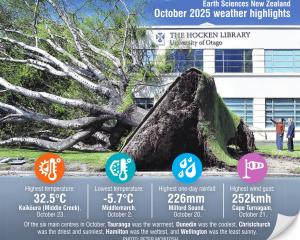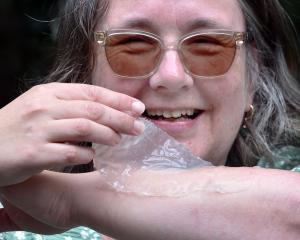A family spokeswoman told NZPA a public memorial service will be held in the Edgar Centre, at 1pm on Wednesday followed by private cremation.
Coach of dual Olympic gold medal swimmer Danyon Loader, Laing had been ill for some time.
Laing has had health problems in recent years , including an operation for a brain tumour and having a melanoma removed from his leg in 2006.
The retiring Laing, who guided Loader to a double gold medal at the 1996 Atlanta Olympics, was made a Companion of the New Zealand Order of Merit in 2007s Queen's Birthday honours. He had been awarded an OBE earlier.
A big man with a commanding presence, Duncan Laing sat poolside for decades, cajoling, encouraging, demanding better from his charges.
One of New Zealand's most celebrated sports coaches, Laing is best remembered for the 200m and 400m freestyle swimming gold medals won at the 1996 Atlanta Olympics by his star pupil, Danyon Loader.
Laing had been troubled by poor health in his latter years, after retiring from coaching in late 2006 following a 40-year career contracted to Moana Pool in Dunedin.
He was treated in hospital in 2006 for a melanoma-like growth which was removed from his leg and in the same year he had surgery to remove a brain tumour.
His passing will be mourned by many, inside and outside of swimming, because Laing had a profound impact on thousands of swimmers, from toddlers to the elite level. He treated all the same, no matter their abilities. All he asked of anyone was that they give of their best.
He certainly did his best by swimming.
Laing's long service to the sport has been recognised by any number of honours down the years.
He was made a Companion of the New Zealand Order of Merit in the Queen's Birthday Honours in 2005, and was also awarded an OBE in 1993, made a life member of Swimming New Zealand in 1996 and inducted into the New Zealand Sports Hall of Fame in 2005.
As well, Laing was named New Zealand's top sports coach at the Halberg awards in 1992 and 1996.
Former Olympic chef de mission Dave Gerrard once described Laing as "the Arthur Lydiard of New Zealand swimming," referring to the legendary athletics coach, who was credited with popularising the sport of jogging.
Gerrard did not make the comparison lightly and it was an accurate observation.
Both men trained athletes who won multiple Olympic medals. Under Lydiard's tutelage, runner Peter Snell won three gold medals at the 1960 and 1964 Olympic games.
Three decades later, Loader won a pair of golds in the pool in Atlanta, following on from the 200m butterfly silver he won four years earlier at the 1992 Barcelona Olympics.
Laing acknowledged the debt he owed to Lydiard, who died in 2004.
"I more or less copied what I thought were Arthur Lydiard's methods -- good steady mileage, building strength, heart and lungs.
"And as (swimmers) got stronger and better, and tried to work on the technique I thought was right, they started to get faster." Laing was regarded by his coaching peers as a master technician.
His understanding of the swim stroke was said to be so perceptive that he could tell whether a stroke was correct or not simply by the sound made by the swimmer through the water.
But Laing, who worked with 11 Olympic swimmers, said he derived as much enjoyment from helping water-shy children overcome their fears as he did guiding those with serious swimming ambitions.
"I've seen kids come in, afraid to put their faces in the water. Two weeks later, their parents can't get them out of it. The children just grow in stature by learning to swim," he said.
"I have always been a committed believer that if you put in the work, you get the result.
"Our main objective is to teach children to swim to be able to save themselves, and maybe someone else. Then, if they want to carry it further, they can."
Laing began his long career in swimming in 1966 when he moved from Taranaki to Dunedin to take up the position of professional swim coach at Moana Pool. He had represented Taranaki at swimming, rugby and surf lifesaving -- captaining his country in the latter at the 1956 World Cup -- and continued to coach rugby for some years after that in Dunedin as well as serving for a period as an Otago selector.
When he officially retired in 2006 Laing wryly observed that it would take some time for him to become accustomed to not getting out of bed every day for pre-dawn training sessions.
"It will be very difficult to finish up. I wish I was 30 years younger and know what I know now."











